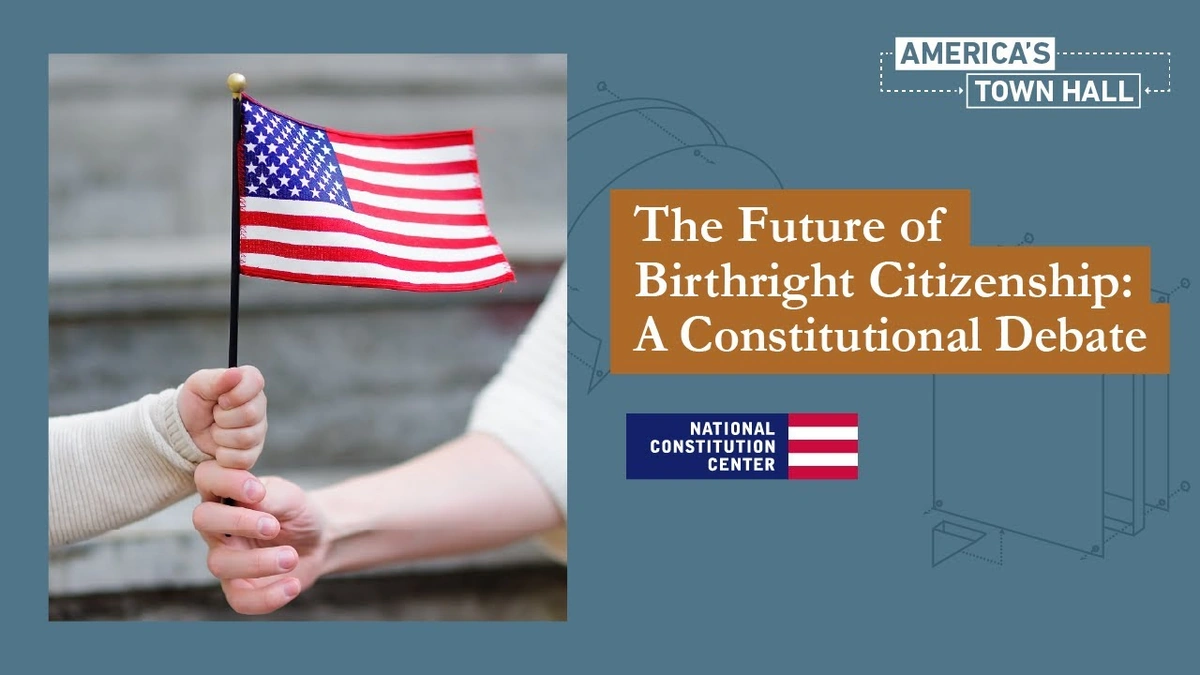Let’s be honest, the idea of birthright citizenship often feels straightforward. You’re born here, you’re a citizen. End of story, right? Well, not exactly. What fascinates me is how this seemingly simple concept is actually layered with legal history, political debate, and real-life implications that affect millions. Here’s the thing: understanding birthright citizenship in the United States is crucial, not just for those directly impacted, but for anyone interested in the future of our nation. This isn’t just about the law; it’s about the evolving definition of who we are.
The “Why” Behind the 14th Amendment | A History Lesson That Still Matters

So, why does the U.S. even have birthright citizenship ? It all boils down to the 14th Amendment. Ratified in 1868, in the wake of the Civil War, it aimed to grant citizenship to formerly enslaved people. The key phrase? “All persons born or naturalized in the United States, and subject to the jurisdiction thereof, are citizens of the United States.” Pretty clear, right?
But – and this is a big “but” – that phrase “subject to the jurisdiction thereof” has been the source of debate for over a century. Does it apply to everyone born within U.S. borders? Or are there exceptions? This is where things get complex. The reason it matters now is because the interpretation of this clause directly impacts immigration policy, debates around anchor babies, and even discussions about who truly belongs here. Thinking about the broader impact of immigration on society is always top of mind. You can also consider the impact of immigration on mental health here .
Understanding the Exceptions | Who Isn’t Automatically a Citizen?
Okay, let’s dive into the exceptions, because they’re crucial. While the 14th Amendment is broad, it’s not absolute. The most commonly cited exceptions involve:
- Children of foreign diplomats stationed in the U.S. (they aren’t considered under U.S. jurisdiction)
- Children born to invading forces.
However, the waters get murkier when we talk about undocumented immigrants. The Supreme Court case United States v. Wong Kim Ark (1898) solidified that children born to Chinese immigrants, even if their parents were not eligible for citizenship, were still citizens under the 14th Amendment. This case is foundational.
And this is why discussions around immigration reform and border security are so closely tied to the idea of jus soli , which is the legal term for birthright citizenship . The debate is rarely about the Constitution itself but about how we interpret those crucial words: “subject to the jurisdiction thereof.”
The Political Football | How Birthright Citizenship Became a Battleground
Here’s where things get heated. Over the years, birthright citizenship has become a political football. Some politicians have proposed amending the 14th Amendment or passing laws to redefine “jurisdiction” to exclude children of undocumented immigrants. Why? Because they argue it incentivizes illegal immigration and strains social services. These proposals, while controversial, highlight a deep-seated tension between different visions of American identity and national interest. What does this all mean for citizens? Take a look at how NATO is involved here .
Let me rephrase that for clarity: the debate isn’t just about legal technicalities; it’s about values, priorities, and the future of the country. Understanding the history and context of these debates is essential to forming your own informed opinion.
Real-Life Implications | Beyond the Headlines
The debates around birthright citizenship have real-life consequences. Think about it: families facing deportation, children unsure of their status, and communities grappling with the uncertainty of changing laws. These are not abstract concepts; they are human stories. What initially thought this was straightforward, but then I realized how much is at stake for immigrants and their families.
For example, a child born in the U.S. to undocumented parents has the same rights and opportunities as any other citizen: access to education, healthcare, and the right to vote when they turn 18. But their future can be uncertain, depending on the immigration status of their parents. This creates a complex web of legal and emotional challenges.
This isn’t just a political debate; it is an emotional one, too.
The Future of Birthright Citizenship | What’s Next?
So, what does the future hold for birthright citizenship ? It’s hard to say for sure. Legal challenges are likely to continue, and the political debate will undoubtedly rage on. But one thing is clear: this issue isn’t going away anytime soon. Understanding the history, the legal precedents, and the real-life implications is crucial for anyone who wants to participate in the conversation. And, ultimately, that’s all of us.
I’ll be honest: I am not sure what the future holds. But engaging in informed debate is where we can start.
FAQ About Birthright Citizenship
What exactly does the 14th Amendment say about citizenship?
The 14th Amendment states: “All persons born or naturalized in the United States, and subject to the jurisdiction thereof, are citizens of the United States…”
Are there exceptions to birthright citizenship in the U.S.?
Yes, primarily children of foreign diplomats stationed in the U.S. are generally not considered citizens at birth.
What is United States v. Wong Kim Ark and why is it important?
This Supreme Court case (1898) affirmed that children born in the U.S. to immigrant parents are citizens under the 14th Amendment.
Can birthright citizenship be changed?
Amending the Constitution is a complex process, requiring a two-thirds vote in both houses of Congress and ratification by three-quarters of the states.
What does “subject to the jurisdiction thereof” really mean?
This phrase has been interpreted by the Supreme Court to generally include anyone physically present in the U.S. and owing allegiance to it, excluding foreign diplomats and enemy forces.




